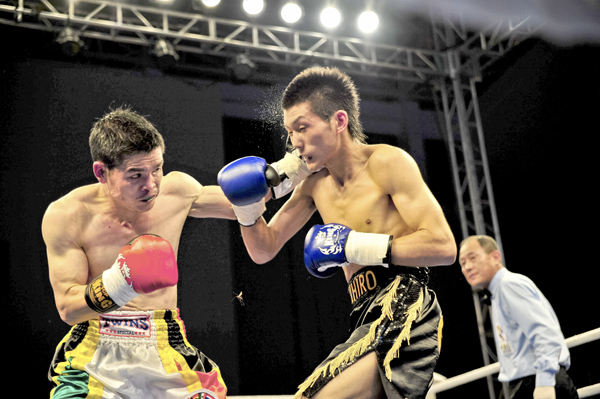
Qi Moxiang, left, in the ring (Liu Yang/Zeitgeist Films)
At the 2008 Beijing Olympics, three Chinese boxers won gold, silver, and bronze medals, almost 50 years since Mao banned boxing, declaring it as brutal as capitalism, and just over 20 years since the government resumed competitions. China Heavyweight personalizes how the country’s nationalistic drive to succeed internationally plays out in the familiar story of ambitious individuals who have the goal to use their fists as a way out and up.
Director Yung Chang found a wellspring from where this surge in boxers is generated, and stuck with coaches and hopefuls over two years. In Sichuan Province, recruiters and coaches look out for both middle school boys and girls, run boxing schools, and train students for provincial competitions that prepare boxers for national matches. Zhao Zhong, a former weightlifter who looks every inch the martial arts master with flowing beard and mustache, describes how he sizes up potential pugilists amongst the throngs of kids. He examines their potential to adhere to strict training regimens, besides looking for strength and body type. (While the mass tryouts with party supported group cheers have shades of the old East German sports machine, I’ve seen ballet-in-the-schools programs in New York use the same approach.) He tantalizingly promotes boxing as their only way out of their poor agricultural area, and briefly explains integrating Confucian principles of perseverance and cooperation to modify the Western emphasis on boxing as a pummeling blood sport.
After seeing how shy young girls develop confidence in Zhao Zhong’s novice training program, the documentary then focuses on two teenage boys who are taking the next steps up in their training with a boxer Zhao mentored, Qi Moxiang, an engaging 32-year-old and China’s first professional boxer. He’s now dedicated to successfully bringing younger fighters along his path. Familiar from fiction anywhere in the world, the two youth not only have to undergo the physical rigors of training, but deal with poor parents who are proud of their success, but really would rather have them work on the family farms than bring home more useless shiny trophies.
The pressures play out differently on each teenager (one taciturn, the other more outgoing). Their other physically grueling options—tobacco harvests or construction work on urban middle-class apartments—makes visually clear the attractions of boxing in an increasingly competitive society. While advising these protégés, Qi becomes nostalgic for his own fighting days, and, in the film’s final section, he sets out, more than a bit quixotically, on a comeback. The not-quite Rocky-like finale demonstrates the emotional impact of the differences between Chinese and Western fighting styles and scoring in the ring.
Several recent boxing documentaries have similarly focused on international aspirants with unusual backgrounds, including the Russian Jew in Orthodox Stance (2008) and the Ukrainian brothers in Klitschko (2011). This up-close and personal portrait of the individual determination and nationalistic fervor that seems to be driving China to the top in so many fields surmounts the sameness of this universal story.






Leave A Comment